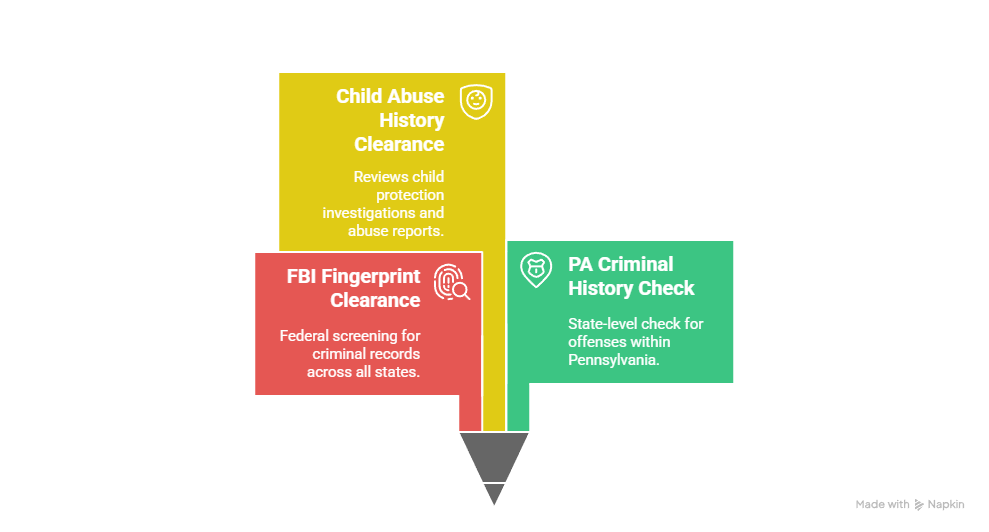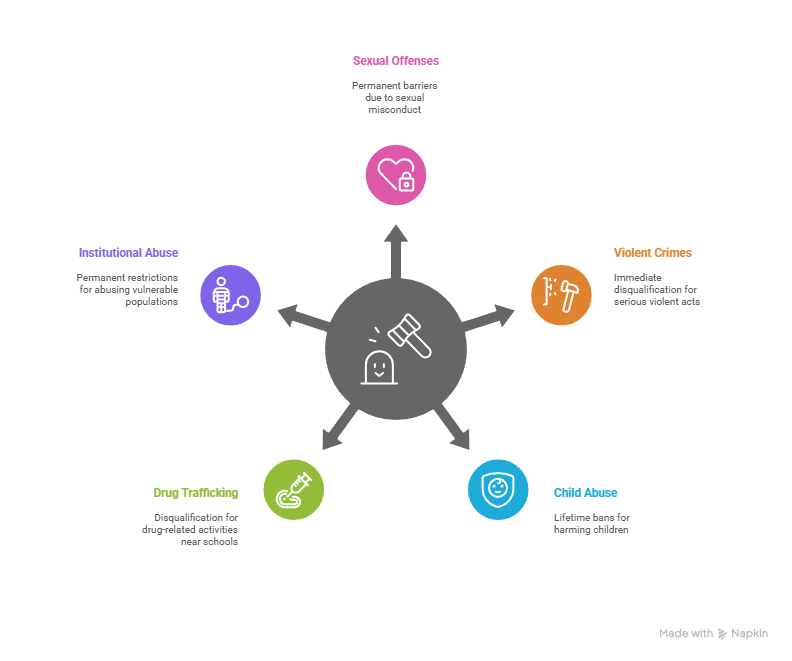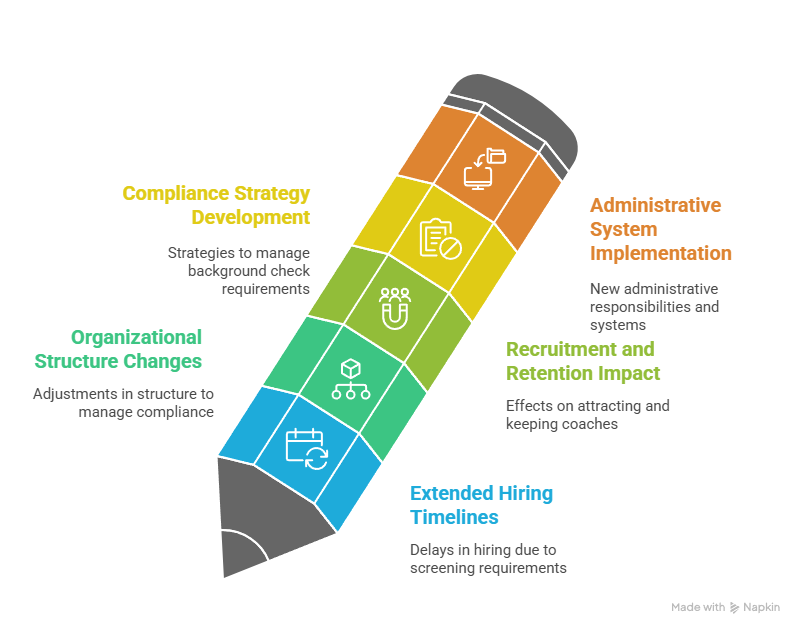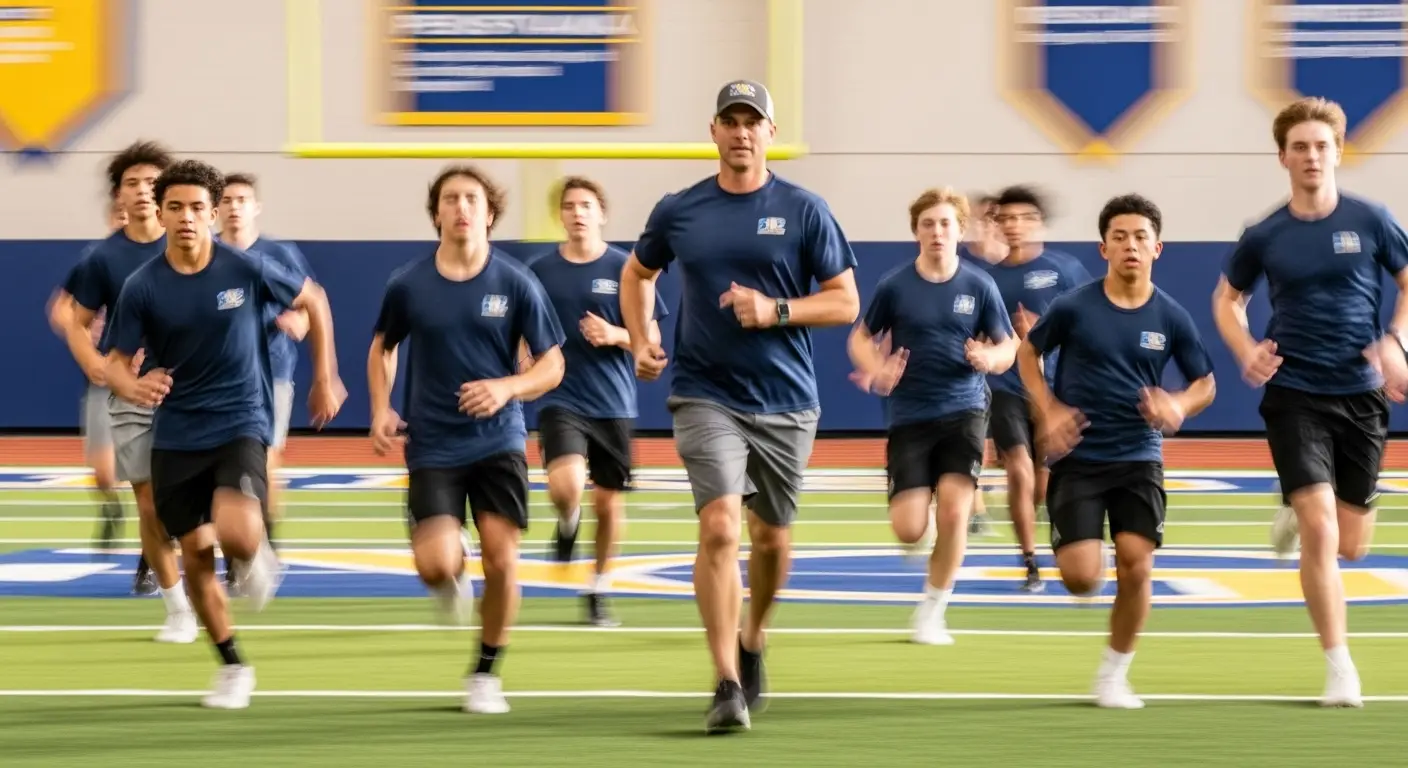Pennsylvania mandates comprehensive background checks for youth sports coaches through Act 153, requiring FBI fingerprint clearances, Pennsylvania criminal history checks, and child abuse clearances. These requirements ensure child safety while creating employment opportunities for qualified individuals in youth athletics programs.
Key Takeaways
- Pennsylvania coaches must complete three mandatory background checks: FBI fingerprint clearance, Pennsylvania criminal history record, and child abuse clearance before working with minors
- Act 153 requires background check renewals every five years for continued coaching eligibility in youth sports programs
- Volunteer coaches face the same screening requirements as paid coaching staff, with no exemptions based on compensation status
- Background check costs range from $27.50 to $42.25 per clearance, though some organizations may reimburse these expenses
- Certain criminal convictions create permanent barriers to coaching, while others may allow conditional approval based on circumstances
- Digital clearances expedite the hiring process, with most results available within 2-3 business days for Pennsylvania-based applicants
Pennsylvania Coach Background Check Legal Framework
Pennsylvania's youth sports coaching requirements come from comprehensive child protection laws. Act 153 was passed in 2014. This law establishes mandatory background screening for anyone working with children in organized activities. As a result, this law applies to all youth sports organizations. Furthermore, it covers organizations regardless of their size or funding structure.
The legislation covers coaches, assistant coaches, team managers, and support staff. However, these individuals must have direct contact with minors. Additionally, the law extends to volunteer positions. Therefore, this ensures consistent protection standards across all youth athletics programs. These requirements reflect Pennsylvania's commitment to creating safe environments for young athletes. Moreover, they maintain clear hiring standards for sports organizations.
Pennsylvania follows federal guidelines for background screening procedures. The state also implements additional protections beyond minimum federal requirements. Consequently, these enhanced measures provide comprehensive safety protocols for youth programs. Organizations must understand both state and federal compliance obligations. Otherwise, they risk serious legal and financial consequences.
State regulations apply to various youth sports settings. These include school-based programs, community leagues, private clubs, and recreational facilities. Similarly, religious organizations and nonprofit groups must follow identical requirements. The law makes no exceptions based on organization type or tax status. Therefore, all youth sports programs operate under the same safety standards.
Required Background Check Components
Pennsylvania coach background checks consist of three distinct clearances. These components work together to provide comprehensive screening. Each clearance serves a specific purpose in evaluating an applicant's suitability. Understanding these requirements helps coaches and employers navigate the screening process efficiently.

The mandatory screening components include federal, state, and child-specific background investigations. These checks examine different databases and timeframes. As a result, they create a complete picture of an applicant's background. Organizations must verify that all three clearances are current and valid. Additionally, they must confirm validity before allowing coaching duties to begin.
FBI Fingerprint Clearance
The FBI fingerprint clearance represents the most comprehensive component of Pennsylvania's coaching background check system. This federal screening examines criminal records across all 50 states. Moreover, it covers federal jurisdictions nationwide. The process requires digital fingerprinting at authorized locations throughout Pennsylvania.
Fingerprint clearances cost $27.50. They remain valid for five years from the issue date. However, first-time Pennsylvania applicants often receive this clearance at no charge. The digital format allows for faster processing. Consequently, most results become available within two business days.
Pennsylvania Criminal History Record Check
The Pennsylvania State Police conduct criminal history record checks. These screenings focus on state-level offenses specifically. This screening examines convictions, pending charges, and court records within Pennsylvania's jurisdiction. The process occurs entirely online through the Pennsylvania State Police website.
State criminal history checks cost $10. They provide immediate results for most applicants. This clearance also remains valid for five years. Additionally, it must be renewed simultaneously with other required screenings. The system flags any disqualifying offenses automatically during the application process.
Child Abuse History Clearance
Child abuse clearances specifically examine records related to child protection investigations. They also review founded reports of abuse or neglect. The Pennsylvania Department of Human Services maintains these records. They provide clearances through their online portal. This screening focuses exclusively on interactions with children and vulnerable populations.
Child abuse clearances cost $13 for employed coaches. However, they are free for volunteers. The clearance examines both founded and indicated reports of child abuse or neglect. Like other components, this clearance remains valid for five years. Therefore, it requires renewal for continued coaching eligibility.
Application Process and Procedures
Obtaining Pennsylvania coach background checks involves completing separate applications for each required clearance. Most organizations recommend starting the process 3-4 weeks before anticipated coaching duties begin. The online application system streamlines most procedures. However, fingerprinting requires in-person visits to approved locations.
Applicants must provide consistent personal information across all three applications. This consistency helps avoid processing delays. Common required information includes full legal name, current address, date of birth, and Social Security number. Additionally, the FBI clearance requires digital fingerprints. These fingerprints must be collected at approved locations throughout the state.
Each application has specific requirements and procedures. The FBI clearance involves the most complex process. Applicants must schedule fingerprinting appointments in advance. They must also bring proper identification and payment. State clearances offer more convenience through online processing. Child abuse clearances provide the fastest turnaround times for most applicants.
Processing times vary depending on several factors. Background check volume affects overall timeframes. Additionally, incomplete applications cause significant delays. First-time applicants may experience longer processing periods. Therefore, early application submission becomes crucial for meeting coaching deadlines.
Documentation Requirements
Proper documentation ensures smooth processing for all background check components. Each clearance type requires specific documents and information. Incomplete applications face automatic rejection. Consequently, they require resubmission with correct information. Organizations often assist coaches with application preparation to minimize delays and errors.
The FBI fingerprint clearance requires government-issued photo identification. Acceptable forms include driver's licenses, state ID cards, or passports. Applicants must also bring completed application forms to fingerprinting appointments. Some locations accept walk-ins, while others require advance scheduling.
Pennsylvania criminal history checks need basic personal information. This includes full name, date of birth, and Social Security number. The online system validates information instantly. However, incorrect data causes immediate rejection. Therefore, applicants should double-check all entries before submission.
Child abuse clearances require employment verification for paid positions. Volunteer applications need organizational sponsorship information. The system also requests previous address history for comprehensive screening. Additionally, applicants must provide contact information for result delivery.
Processing Timeline and Expectations
| Clearance Type | Standard Processing | Rush Options | Validity Period |
| FBI Fingerprint | 3-10 business days | Not available | 5 years |
| PA Criminal History | Immediate online | N/A - Instant | 5 years |
| Child Abuse History | 1-2 business days | Not available | 5 years |
Processing timelines help organizations plan their hiring schedules effectively. Standard processing meets most organizational needs. However, urgent hiring situations may require alternative strategies. Some organizations maintain pools of pre-cleared candidates. This approach reduces delays during peak hiring periods.
Disqualifying Offenses and Restrictions
Pennsylvania maintains specific lists of criminal offenses that create barriers to youth sports coaching positions. These restrictions fall into two categories: permanent disqualifications and conditional approvals. The categories depend on individual circumstances and offense severity. Understanding these limitations helps applicants assess their eligibility before beginning the application process.
Serious violent crimes, sexual offenses, and child abuse convictions typically result in permanent coaching bans. These decisions reflect the state's commitment to child safety. However, some minor offenses may receive conditional approval through a detailed review process. The Pennsylvania Department of Human Services evaluates each case individually. This occurs when offenses fall into gray areas of interpretation.
Automatic Disqualifications
Certain criminal convictions create immediate and permanent barriers to coaching youth sports in Pennsylvania. These offenses reflect serious risks to child safety and welfare. The state maintains zero tolerance for these conviction types.
The following offenses result in automatic disqualification from youth coaching positions:

- Sexual offenses: Any conviction involving sexual contact with minors or adults creates permanent barriers
- Violent crimes: Murder, aggravated assault, kidnapping, or similar serious offenses disqualify applicants immediately
- Child abuse: Physical, sexual, or severe emotional abuse of children results in lifetime coaching bans
- Drug trafficking: Manufacturing or distributing controlled substances near schools creates automatic disqualification
- Institutional abuse: Offenses committed while working with vulnerable populations result in permanent restrictions
These disqualifications apply regardless of when the conviction occurred. They also apply regardless of circumstances surrounding the case. Additionally, pending charges for these offenses prevent coaching eligibility until case resolution. Appeals processes exist but rarely result in overturned decisions for serious offenses.
Conditional Review Cases
Some offenses trigger individual case reviews rather than automatic disqualification. The review process considers multiple factors in making decisions. These factors include offense severity, time elapsed, rehabilitation efforts, and relevance to youth coaching. Common conditional review offenses include simple assault, DUI convictions, theft, and drug possession charges.
The review process can take 2-4 weeks beyond standard processing times. This additional time creates challenges for organizations with immediate hiring needs. Applicants may provide supporting documentation demonstrating rehabilitation. They can also submit character references from community members. However, organizations often cannot wait for conditional reviews. Therefore, it becomes important to disclose potential issues early in the hiring process.
Renewal and Maintenance Requirements
Pennsylvania coach background checks require renewal every five years to maintain current status. The renewal process follows the same procedures as initial applications. This includes new fingerprinting for FBI clearances. Organizations must track expiration dates carefully. Additionally, they must ensure renewals occur before current clearances expire.
Coaches cannot continue working with youth sports teams once their clearances expire. This rule applies even if the expiration occurs by a single day. This strict enforcement protects organizations from liability. Moreover, it ensures continuous compliance with state regulations. Many organizations implement tracking systems to monitor renewal deadlines for all staff members.
Renewal planning becomes crucial for maintaining coaching staff continuity. Organizations should begin renewal processes well before expiration dates. This approach accounts for potential delays and processing issues. Some coaches choose to renew all clearances simultaneously. This occurs even if expiration dates differ slightly between components.
The renewal process costs the same as initial applications. However, organizations may budget differently for ongoing expenses. Some programs build renewal costs into their annual operating budgets. Others require coaches to handle their own renewal expenses and scheduling.
Renewal Timeline and Planning
Effective renewal planning prevents coaching interruptions and maintains program continuity. Organizations should establish systematic approaches to tracking clearance expiration dates. Digital calendars and reminder systems help prevent oversight. Additionally, some organizations assign specific staff members to manage compliance tracking.
Early renewal provides several advantages over last-minute processing. It allows time for addressing unexpected issues or delays. Furthermore, it ensures coaching staff availability during critical program periods. Organizations should consider seasonal schedules when planning renewal timelines.
The renewal process requires the same documentation as initial applications. Coaches must schedule new fingerprinting appointments for FBI clearances. They must also complete new online applications for state and child abuse clearances. Therefore, the time and effort requirements remain identical to initial screening procedures.
Organizational Tracking Systems
| Component | Renewal Frequency | Advance Notice Recommended | Processing Time |
| FBI Fingerprint | Every 5 years | 6 weeks | 3-10 business days |
| PA Criminal History | Every 5 years | 2 weeks | Immediate online |
| Child Abuse Clearance | Every 5 years | 2 weeks | 1-2 business days |
Tracking systems help organizations maintain compliance while reducing administrative burden. Digital solutions provide automated reminders and reporting capabilities. Some organizations integrate background check tracking into existing management software. This integration streamlines compliance monitoring and reduces duplicate data entry.
Cost Considerations and Financial Responsibility
The total cost for Pennsylvania coach background checks ranges from $27.50 to $50.50. This depends on volunteer status and first-time applicant benefits. These expenses represent a significant consideration for both individual coaches and youth sports organizations. Many programs develop policies addressing who bears responsibility for background check costs.
Some organizations reimburse background check expenses as part of their coach recruitment efforts. Others require coaches to pay these costs upfront as a condition of employment or volunteering. Additionally, certain grants and funding programs may cover background check expenses. These programs typically target qualifying youth sports organizations in underserved communities.
Cost considerations affect recruitment and retention of quality coaching staff. High expenses may discourage volunteer participation in some communities. Conversely, organizational reimbursement policies can attract more qualified candidates. Therefore, organizations must balance cost management with program quality objectives.
Budget planning should account for both initial and renewal expenses. Organizations with large coaching staffs face substantial ongoing costs. Additionally, coach turnover increases overall background check expenses. Therefore, retention strategies become important for cost management.
Cost Breakdown and Payment Options
Pennsylvania coach background check costs vary based on applicant status and clearance type. Understanding these variations helps with budget planning and financial responsibility decisions. Organizations should communicate cost expectations clearly during recruitment processes.
The following costs apply to Pennsylvania coach background checks:
- FBI Fingerprint Clearance: $27.50 (often waived for first-time PA applicants)
- PA Criminal History Check: $10.00 (required for all applicants regardless of status)
- Child Abuse Clearance: $13.00 for employees, free for volunteers
- Processing fees: Varies by fingerprinting location ($5-15 typical range)
Payment methods include credit cards, money orders, and electronic transfers. The specific method depends on the clearance type and processing location. The FBI clearance requires payment at fingerprinting locations. Meanwhile, state clearances accept online payments through secure portals. Organizations should budget for these recurring expenses when planning coaching staff expansion.
Financial Assistance and Reimbursement Programs
Some organizations and funding sources provide financial assistance for background check costs. These programs recognize that expenses can create barriers to volunteer participation. Additionally, they support youth sports access in underserved communities.
Grant programs occasionally cover background check expenses for qualifying organizations. Community foundations may also provide funding for youth sports safety initiatives. Furthermore, some large youth sports organizations negotiate group rates for background check services. These arrangements can reduce per-coach costs significantly.
Reimbursement policies vary widely among youth sports organizations. Some programs cover all background check costs for coaches. Others provide partial reimbursement or expense allowances. Additionally, some organizations tie reimbursement to coaching commitment periods or performance standards.
Impact on Youth Sports Organizations
Pennsylvania's coach background check requirements significantly influence how youth sports organizations operate and manage their programs. These regulations affect recruitment strategies, hiring timelines, and administrative procedures across all levels of youth athletics, from recreational leagues to competitive travel teams.

- Extended Hiring Timelines: The screening requirements often extend hiring timelines by several weeks, requiring advance planning for seasonal sports programs. Organizations must implement tracking systems to monitor clearance expiration dates and manage renewal requirements for all coaching staff. These administrative demands create additional operational costs beyond the direct expenses of background checks themselves.
- Organizational Structure Changes: Compliance requirements affect organizational structure and resource allocation as many programs designate specific staff members to handle background check coordination. They also invest in software systems to track compliance status and develop policies for handling non-compliant situations and emergency coaching needs. These structural changes represent significant operational adjustments for many youth sports programs.
- Recruitment and Retention Impact: The requirements also influence coach recruitment and retention strategies as organizations must communicate screening requirements clearly during initial recruitment contacts. They must also provide support and guidance throughout the application process while developing contingency plans for situations where background checks reveal disqualifying information. These additional responsibilities require enhanced communication and planning capabilities from organizational leadership.
- Compliance Strategy Development: Successful youth sports organizations develop structured approaches to manage background check requirements effectively through designated compliance coordinators and digital tracking systems. They also implement clear communication protocols with coaching staff and create standardized timelines that account for background check processing delays. Training programs help organizational leaders understand their legal obligations and liability risks associated with non-compliance.
- Administrative System Implementation: Background check requirements create new administrative responsibilities that require dedicated time and resources from organizational leadership. Many programs hire administrative staff specifically to handle compliance functions while maintaining secure files for all coaching staff clearances. Technology solutions help streamline administrative burdens through digital filing systems, automated reminder systems, and integrated management software that links background check status to coaching assignments and responsibilities.
These comprehensive changes transform how youth sports organizations operate while ensuring consistent safety standards for young athletes throughout Pennsylvania.Add to Conversation
Background Check Processing and Technology
Modern technology streamlines Pennsylvania's coach background check process through digital applications and automated processing systems. Online portals allow applicants to complete most requirements from home. Meanwhile, digital fingerprinting locations use advanced equipment for faster FBI submissions. These technological improvements reduce processing times and minimize paperwork for both applicants and organizations.
Electronic clearance delivery provides immediate access to approved background checks. This occurs through secure online portals that protect sensitive information. This digital format eliminates mail delays and reduces the risk of lost documentation. Additionally, many organizations integrate background check tracking into their existing management software systems. This integration enables better compliance monitoring and administrative efficiency.
Digital systems also improve accuracy and reduce human error in the screening process. Automated data validation catches common mistakes before submission. Electronic processing eliminates handwriting interpretation issues. Furthermore, digital records provide better audit trails for compliance verification and legal protection.
The technology continues evolving to meet user needs and security requirements. Mobile applications allow greater convenience for applicants. Enhanced security features protect personal information throughout the process. Additionally, integration capabilities improve compatibility with organizational management systems.
Digital Processing Advantages
Digital background check systems offer several benefits over traditional paper-based processes. These advantages benefit both individual applicants and organizational users. Understanding these benefits helps stakeholders make informed decisions about technology adoption and process improvements.
The following advantages highlight digital processing benefits:
- Faster processing times: Electronic submissions reduce handling delays and administrative bottlenecks significantly
- Immediate results access: Approved clearances become available instantly through secure online portals
- Automated renewals: System notifications alert users about upcoming expiration dates well in advance
- Reduced paperwork: Digital storage eliminates physical document management requirements and filing costs
- Enhanced security: Encrypted systems protect sensitive personal information during transmission and storage
These technological advantages help organizations manage larger coaching staffs more efficiently. They also maintain compliance with Pennsylvania's requirements more effectively. Additionally, digital systems provide audit trails that demonstrate ongoing compliance efforts. This documentation proves valuable during regulatory reviews or legal proceedings.
System Security and Privacy Protection
Digital background check systems implement multiple security layers to protect sensitive personal information. Encryption technology secures data during transmission between systems. Secure servers protect stored information from unauthorized access. Additionally, user authentication protocols ensure only authorized individuals access clearance information.
Privacy protection measures comply with both state and federal requirements. Systems limit access to background check information on a need-to-know basis. They also maintain detailed logs of all system access and data usage. Furthermore, automatic data retention policies ensure information disposal according to legal requirements.
Organizations using digital background check systems must also implement their own security measures. This includes secure storage of login credentials and access information. They must also establish protocols for handling and sharing clearance information. Additionally, staff training ensures proper handling of sensitive background check data throughout organizational operations.
Special Considerations and Exceptions
Pennsylvania's coach background check requirements include specific provisions for unique situations and circumstances. These special considerations address practical challenges that organizations and coaches may encounter. Understanding these provisions helps ensure compliance while maintaining program flexibility and accessibility.
Emergency coaching situations receive special attention under Pennsylvania regulations. Organizations may face situations where immediate coaching coverage becomes necessary. However, the law provides limited flexibility for these circumstances. Emergency coaching assignments must still comply with background check requirements. Therefore, organizations should maintain pools of pre-cleared substitute coaches.
Out-of-state coaches face additional complexity in meeting Pennsylvania requirements. Their previous clearances from other states do not transfer automatically. However, some expedited processing options may apply to qualified applicants. Organizations recruiting out-of-state coaches should allow extra time for background check completion.
Interstate youth sports competitions create unique compliance challenges. Coaches from other states may accompany their teams to Pennsylvania events. However, they must still meet Pennsylvania's background check requirements for youth interaction. Event organizers should communicate these requirements clearly to participating organizations.
Volunteer vs. Paid Coach Distinctions
Pennsylvania treats volunteer and paid coaches identically for most background check requirements. Both categories must complete all three required clearances. They must also maintain current status through regular renewals. However, some cost differences apply between volunteer and paid positions.
Volunteer coaches receive free child abuse clearances, while paid coaches pay $13 for this component. This cost difference reflects Pennsylvania's support for volunteer youth sports participation. However, organizations should verify volunteer status requirements and documentation. Misclassification can result in compliance issues and financial penalties.
The volunteer designation depends on compensation and employment structure rather than organizational classification. Coaches receiving any form of payment typically qualify as employees for background check purposes. This includes stipends, equipment allowances, or other indirect compensation. Therefore, organizations should clarify compensation structures before determining background check costs.
Religious and Private Organization Considerations
| Organization Type | Background Check Requirements | Special Provisions | Compliance Authority |
| Public Schools | Full state requirements | None | Department of Education |
| Private Schools | Full state requirements | None | Department of Education |
| Religious Organizations | Full state requirements | Limited exemptions for clergy | Department of Human Services |
| Nonprofit Youth Programs | Full state requirements | None | Department of Human Services |
Religious organizations must comply with Pennsylvania's coach background check requirements despite their special status in other areas. However, some limited exemptions may apply to ordained clergy in specific circumstances. These exemptions require careful legal review and documentation. Most religious youth sports programs operate under standard compliance requirements.
Conclusion
Pennsylvania's coach background check requirements create comprehensive protection for youth athletes while establishing clear standards for coaching eligibility. The three-component screening process examines federal, state, and child-specific records to identify potential risks before they impact young participants. Organizations and individual coaches must understand these requirements to ensure smooth program operations and legal compliance. By implementing proper procedures and planning for renewal cycles, youth sports programs can maintain high safety standards while providing quality athletic experiences for Pennsylvania's young athletes.
Frequently Asked Questions
How long do Pennsylvania coach background checks take to complete?
Most Pennsylvania coach background checks process within 2-3 business days for state components, while FBI fingerprint clearances typically take 3-10 business days. However, first-time applicants should allow 3-4 weeks for the complete process, including scheduling fingerprinting appointments and potential delays.
Can coaches work while their background checks are pending?
No, Pennsylvania law prohibits coaches from working with youth sports teams until all three required background checks are completed and approved. Organizations face liability risks and potential penalties for allowing uncleared coaches to participate in youth programs.
What happens if a coach's background check expires during the season?
Coaches must immediately stop working with youth teams when their background checks expire, even if renewals are pending. Organizations cannot make exceptions to this rule, making it crucial to track expiration dates and begin renewal processes well in advance.
Are volunteer coaches subject to the same background check requirements as paid staff?
Yes, Pennsylvania requires identical background checks for both volunteer and paid coaches working with youth sports teams. The only difference is that volunteers receive free child abuse clearances, while paid coaches must pay $13 for this component.
How much do Pennsylvania coach background checks cost in total?
Total costs range from $27.50 to $50.50 depending on volunteer status and whether applicants qualify for first-time FBI clearance waivers. Additional fingerprinting location fees may apply, typically ranging from $5-15 per session.
Can coaches with criminal records still work in youth sports?
It depends on the specific offense and circumstances. Serious crimes like sexual offenses, violent felonies, and child abuse create permanent disqualifications. Minor offenses may receive conditional approval through individual case review processes conducted by the Pennsylvania Department of Human Services.
Additional Resources
- Pennsylvania State Police Criminal Records Check Portal
https://epatch.state.pa.us/ - Pennsylvania Department of Human Services Child Abuse Clearances
https://www.compass.state.pa.us/cwis/public/home - FBI Identity History Summary Checks
https://www.fbi.gov/services/cjis/identity-history-summary-checks - Pennsylvania Act 153 Full Text and Requirements
https://www.legis.state.pa.us/cfdocs/legis/li/uconsCheck.cfm?yr=2014&sessInd=0&act=153 - IdentoGO Pennsylvania Fingerprinting Locations
https://www.identogo.com/locations/pennsylvania - Pennsylvania Department of Education Safe Schools Resources
https://www.education.pa.gov/Teachers%20-%20Administrators/Safe%20Schools/Pages/default.aspx

GCheck Editorial Team
Meet the GCheck Editorial Team, your trusted source for insightful and up-to-date information in the world of employment background checks. Committed to delivering the latest trends, best practices, and industry insights, our team is dedicated to keeping you informed.
With a passion for ensuring accuracy, compliance, and efficiency in background screening, we are your go-to experts in the field. Stay tuned for our comprehensive articles, guides, and analysis, designed to empower businesses and individuals with the knowledge they need to make informed decisions.
At GCheck, we're here to guide you through the complexities of background checks, every step of the way.





